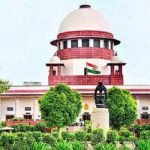New Delhi, Feb 12 (UNI) The Supreme Court has affirmed the authority of the National Commission for Protection of Child Rights (NCPCR) to file complaints under the Madhya Pradesh Freedom of Religion Act, 2021, ruling that the commission’s actions were legally justified and within its statutory mandate to safeguard child rights.
A bench, comprising Justices Dipankar Datta and Manmohan, overturned the Madhya Pradesh High Court’s findings, which had curtailed NCPCR’s powers in cases related to religious conversion.
The ruling came while hearing a Special Leave Petition (SLP) filed by NCPCR against the High Court’s decision granting anticipatory bail to the accused in the Asha Kiran Home case in Katni, Madhya Pradesh.
The High Court had earlier ruled that NCPCR was not a “competent complainant” under the Act, leading the statutory child rights body to challenge the decision in the Supreme Court.
While the apex court did not reverse the grant of anticipatory bail, it clarified that its notice pertained specifically to the issue of NCPCR’s standing as a complainant.
After considering arguments from Senior Advocate Swarupama Chaturvedi, representing NCPCR, the Court ruled that the Madhya Pradesh High Court’s interpretation was erroneous. It emphasized that the NCPCR Chairperson’s actions against the accused were valid and aligned with the commission’s mandate to protect child rights.
Previously, on August 14, 2023, the Supreme Court had issued a notice in the matter, highlighting the need for further deliberation on the interplay of statutory provisions.
The SLP was filed under Article 136 of the Constitution against the High Court’s judgment passed on June 19, 2023, which had granted anticipatory bail to the accused.
The case pertains to an FIR (first information report), registered at Madhav Nagar Police Station, District Katni, under Section 75 of the Juvenile Justice (Care and Protection of Children) Act, 2015, and Sections 3 and 5 of the Madhya Pradesh Freedom of Religion Act, 2021.
The Madhya Pradesh High Court had granted anticipatory bail on the premise that the complaint was lodged by an NCPCR official rather than an aggrieved individual, thereby questioning the commission’s role under the MP Freedom of Religion Act.
The High Court observed: “In the present case, the complaint has been lodged by an individual who conducted the inspection. No complaint has been made by the person converted or the person aggrieved or against whom an attempt was made for conversion, or by their relatives or blood relatives. In the absence of such written complaint, police do not have any jurisdiction to inquire or investigate into offence committed under Section 3 of the Act of 2021.”
In response, NCPCR argued that the High Court failed to recognize its statutory mandate under the Commission for Protection of Child Rights Act, 2005, and the Juvenile Justice Act, 2015. It contended that the High Court’s interpretation was overly technical and ignored the legislative intent behind the statute.
NCPCR stressed that relief granted to the accused on procedural grounds undermined the seriousness of allegations involving minors. It highlighted that minor victims had given statements to the police on May 29, 2023, corroborating the charges.
The Supreme Court upheld NCPCR’s authority to act in cases concerning child rights violations, including religious conversions affecting minors.
The Court directed Attorney General R Venkataramani to obtain instructions from the Centre regarding the timeline for implementing a comprehensive urban poverty alleviation mission, which would also address issues of shelter and child welfare.
It further requested the Attorney General to ensure the continuation of the National Urban Livelihoods Mission until the new scheme is operational. The matter remains under the Supreme Court’s consideration, with further hearings expected on the broader issue of child protection in cases of alleged forced conversions.










